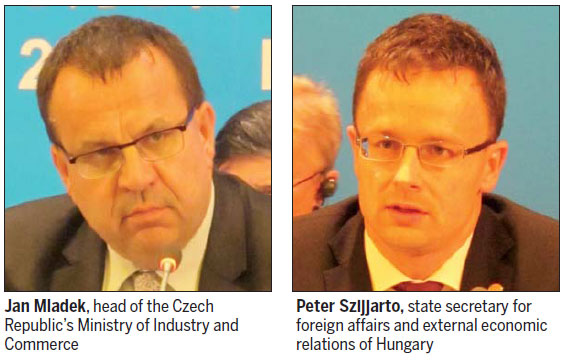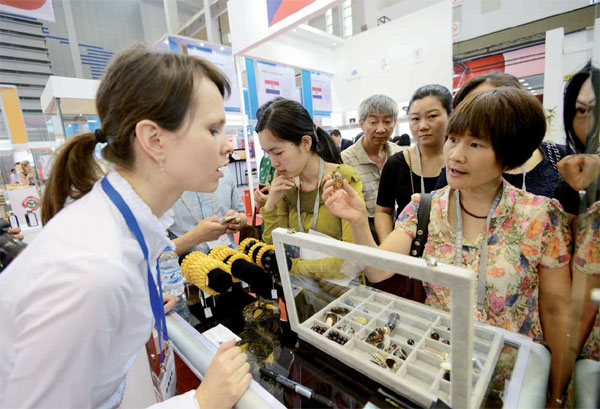Beef and railways on the menu

| Ornaments on sale at the Central and Eastern European Countries' Products Expo in Ningbo, Zhejiang province. Zheng Zaifei / For China Daily |

China to strengthen economic ties with Central and Eastern European countries
China is to expand trade and investment cooperation with Central and Eastern European countries by increasing imports from these countries and helping build their infrastructure construction.
Gao Hucheng, Chinese minister of commerce, said on June 8 that the country would encourage Chinese enterprises to import agricultural and animal products, especially food products, from CEE countries, and help them promote their brand recognition in China.
"Imports of these products are in line with China's domestic demand," Gao said at the Ministerial Conference of China and Central and Eastern European Countries on Promoting Trade and Economic Cooperation, held in Ningbo, Zhejiang province. Along with the conference, an exhibition of CEE specialty products was held from June 8 to June 11.
A total of 180 businesses from the 16 countries brought more than 6,000 categories of products including milk, honey, canned food and cosmetics to promote to Chinese customers. During the four-day exhibition, more than 3,500 domestic purchasers in China came to place orders and discuss purchases.
Gao said that many of these products are in great demand in China and the country is willing to continue to help these qualified products enter the Chinese market.
"We are seeing a trade surplus between China and the CEE countries in recent years," Gao said. "Through this conference, and the exhibition that showcases CEE products, we can see that there are many excellent products from these countries that Chinese consumers are not familiar with."
Trade between China and CEE countries has grown more than fivefold since 2003, and Gao said it could be worth more than $60 billion by the end of this year, up from $55.1 billion last year.
The meeting, which included 109 commerce officials from 16 CEE countries, dealt with topics covering trade promotion, mutual investment and cooperation in building infrastructure.
An important achievement of the meeting was that the two sides published a joint document to boost bilateral trade and investment in multiple fields.
The event followed a meeting in November between Chinese Premier Li Keqiang and leaders of CEE countries in the Romanian capital, Bucharest, in which guidelines on increasing trade and investment exchanges between China and CEE countries was signed.
The two sides agreed to lower trade barriers and promote more investment from China.
Commerce officials from the CEE countries also expressed their optimism about China's economic prospects and their willingness to work more closely with China to look for more development opportunities.
They cited the great potential for trade and investment between the two sides and stressed that mutual trust and understanding between the people and governments is key to strengthen cooperation.
Peter Szijjarto, state secretary for foreign affairs and external economic relations of Hungary, said he expects a bilateral trade record to be set this year.
"Last year, bilateral trade between China and Hungary grew by more than 10 percent year-on-year, a record high in the two countries' history. And I think this year will follow last year to break the record."
Szijjarto said during a meeting with Zhong Shan, China's vice-minister of commerce, on June 7, a license for Hungarian beef, pork, goose and duck exports to China was discussed.
"These products are strong points of our country, but have been the weakest parts of our exports to China. With the license on the way, we believe the exports can reach a record high this year."
According to Szijjarto, Hungary's exports to China exceeded $2 billion last year. Of the exports, only $2 million was for food. The lifting of the ban on several meat products would produce a more balanced trade relationship, he said.
Last year, China's exports to Hungary reached $5.69 billion, having dropped by 0.83 percent year-on-year, while imports from the country grew 16.88 percent to $2.72 billion.
Apart from boosting imports from CEE countries, Gao also said in the meeting that to view things from a broader perspective, it is even more important for China to encourage Chinese businesses to invest in the Europe to achieve a trade balance.
"Chinese companies should not only take part in infrastructure construction in CEE countries, but also participate in their manufacturing sectors so that they can produce products in these countries and then sell these products back to China and also to other countries."
Jan Mladek, head of the Czech Republic's Ministry of Industry and Commerce, said that Czechs welcome Chinese investment in their manufacturing industries, including civil aviation, nuclear energy and biotechnology.
"We would like to see more Chinese companies in the Czech Republic, not only because the single market is large, but also because investing in the Czech Republic is to invest at the entry gate to the European Union. We focus on the progress of our manufacturing industries, and would like to have Chinese investment to make these sectors even stronger."
Investment has been a new development between China and CEE countries in the past 10 years. China's investment in CEE countries grew from less than $500 million 10 years ago to $5 billion by last year.
Cooperation between China and CEE countries will also feature infrastructure projects such as high-speed railways, nuclear power, electricity and ports, Gao said.
Chinese companies now have many flagship infrastructure construction projects in CEE countries, including modernization of Hungary's railway lines and construction of two highways in Macedonia.
Gao said China values infrastructure construction cooperation with CEE countries.
"Last year the Chinese government established a $10 billion loan foundation to support these countries' infrastructure construction, and it is operating well. With Chinese companies' experience and equipment and CEE countries' market demand, it will be a win-win situation in this area," he said.
In a step toward more mutual understanding and higher levels of economic cooperation, Gao said the country will have more exchanges with CEE countries in terms of human resources, including both sides providing more convenience in terms of visas and work permits to increase investment and allow more business exchanges.
Contact the writers at yanyiqi@chinadaily.com.cn and shixf@chinadaily.com.cn
(China Daily European Weekly 06/13/2014 page21)
Today's Top News
- Factory activity sees marginal improvement in November
- Venezuela slams US' 'colonial threat' on its airspace
- Xi: Strengthen cyberspace governance framework
- Takaichi must stop rubbing salt in wounds, retract Taiwan remarks
- Millions vie for civil service jobs
- Chinese landmark trade corridor handles over 5m TEUs































